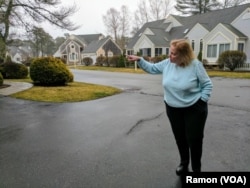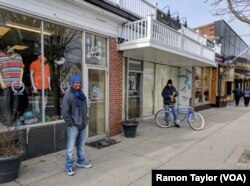Along northeastern Cape Cod off the coast of Massachusetts, April doesn’t usually equate with sunshine and sandcastles. The month is mostly a time of waiting for the fog and chill to lift off the Atlantic Ocean and the tourists to arrive.
But this year is a problem for seasonal businesses, whose model is built around five-to-six-month, low-skilled jobs in areas like hospitality. Few Americans are willing to fill them and now, thousands of foreign seasonal workers may not be allowed into the U.S. to take them.
Changes to the U.S. temporary work visa program, called H2B, are keeping out the workers that businesses count on.
For affected businesses, the financial loss could be plenty.
“It could be 20 percent,” said Allen Sylvester, president of American Tent & Table, Inc., a family-owned tent rental and party accessory business in Cape Cod, Massachusetts.
Sylvester, who has been with the company since 1996, says it earns roughly 85 to 90 percent of its profits in five months — the region’s outdoor wedding season. Fully staffed, the company employs seven to eight Americans and 13 H2B visa workers.
Normally it’s the former group Sylvester has a hard time hiring. But last September, Congress failed to renew a provision that effectively quadrupled the number of H2B visas available in 2016 by not counting returnees against the annual cap. This year, instead of potentially 264,000 visas, there are 66,000 — half allocated in the spring, the other half in the fall.
Businesses in colder areas like Cape Cod, which typically have later start dates, find themselves at a loss. By the time many could complete their visa applications, the cap had been reached.
“Instead of bringing 3,000 workers here, we right now are bringing 300 workers,” said Jane Nichols Bishop, president of Peak Season Workforce, a family-owned business that helps local companies secure annual H2B visas.
Bishop, who calls herself “Mama Visa,” says the 90-day application process that businesses must follow to gain seasonal employment is stringent, including evidence of advertising to recruit American workers.
Of the 171 applications she personally filed for clients, Bishop says 24 made their way through the Department of Homeland Security before all the visas were gone.
Why not hire more Americans?
At 3.4 percent, the February unemployment rate in Massachusetts is lower than the current national average, 4.5 percent, according to data from the Bureau of Labor Statistics.
But as Falmouth, Massachusetts, resident Paul Skudder said, the numbers don’t paint the whole picture on Cape Cod, a community with a growing number of retirees and decreasing number of youth.
“There is a limited number of job opportunities on the Cape for college-educated professional or near professional people, which overall leads to a little bit of an exodus of bright, educated young people,” Skudder said.
Eligible job seekers who are willing to accept low-skilled employment, generally need a permanent source of income. And students can offer just three months of labor during their summer breaks, not five or six.
The well-being of the younger population is also a factor. In 2015, Cape Cod suffered the highest per capita death rate by opioid overdose in Massachusetts and remains one of the most affected areas in the country.
“A lot of the kids I used to know have now passed away,” said Prince Wright, who attended high school in Falmouth. “That’s the big problem right now … most of our locals are not coming in no more. Either they’re locked up or they moved away because of the changes on the Cape.”
More effort needed?
But along Main Street in the Cape’s largest town, not all are convinced that businesses are trying their best to hire local.
“It’s good for the [foreigners] that are coming over here on work visas, but it also takes away from the people that are living on the streets that can work,” said Mary Richard. “I just think it’s hard on the people here too.”
Politicians are divided on the H2B visa program, seeing it as either economically exploitative or a job-killer for Americans.
Republicans, who control both chambers of Congress, send mixed messages. Attorney General Jeff Sessions, the country’s top law enforcement official, has called the H2B program “detrimental to wages and job opportunities of American workers.” But Donald Trump, before he was president, employed H2B workers during peak resort season at his Florida golf club, Mar-a-Lago.
H2B-reliant businesses worry that the visa is unfairly lumped into Trump’s hard-line stance on immigration. And in Bishop’s mind, some legislators simply don’t understand seasonal economies.
“When people come to Cape Cod and the islands, they come to see and visit us. It’s full employment, we are busy, there’s traffic, so they don’t even realize there is a labor shortage,” Bishop said. “But when you come here in January, you may be the only car on the road for quite a while.”
Hiring strategy
Jim Underdah, general manager at the Coonamessett Inn, considers himself one of the lucky few to secure his share of foreign seasonal workers from Jamaica. Still, a backlog in the system has delayed their arrival and forced him to repurpose the limited workforce he retains year-round.
In anticipation of this, Underdah says many businesses like his choose to employ workers full-time even during the offseason, when he doesn’t need them.
“I have people in the kitchen that we work 40 hours for the winter, so they’re not going to leave me,” Underdah said. “They’re gonna say, ‘Hey, they’re treating us good.’ They’re going to be here this spring. They’re going to get me through till hopefully the workers get in.”
Paul Dean, who runs a seafood retail and catering business, was not as lucky. Lacking the workforce he needs to keep his multiple operations running, he says he may be forced to close one of his locations a couple days a week.
Like Sylvester, Dean predicts this would amount to a loss of 20 percent of annual income.
“That means I’m buying 20 percent less product from local vendors,” Dean said. “We’re obviously collecting 20 percent less in meals tax toward the state. We’re not paying payroll taxes … there’s a huge trickle-down effect.”
Dean and Sylvester are crossing their fingers for a last-ditch effort by lawmakers to reinstate an H2B returning worker exemption before April 28, as part of its fiscal year 2017 federal spending bill. But in case that doesn’t happen, Sylvester offers last-resort advice for summer tourists.
“If you’re going to stay over, bring your sheets and some towels,” he joked, “because there’s going to be no one to clean your room.”
WATCH: One Business Owner Talks about the Challenges









